This hard boiled eggs recipe is incredibly easy to follow and turns out perfectly fluffy yellow egg yolks every time. Whether you're making hard boiling eggs for Easter, deviled eggs, or just want an easy snack, this recipe is your answer.
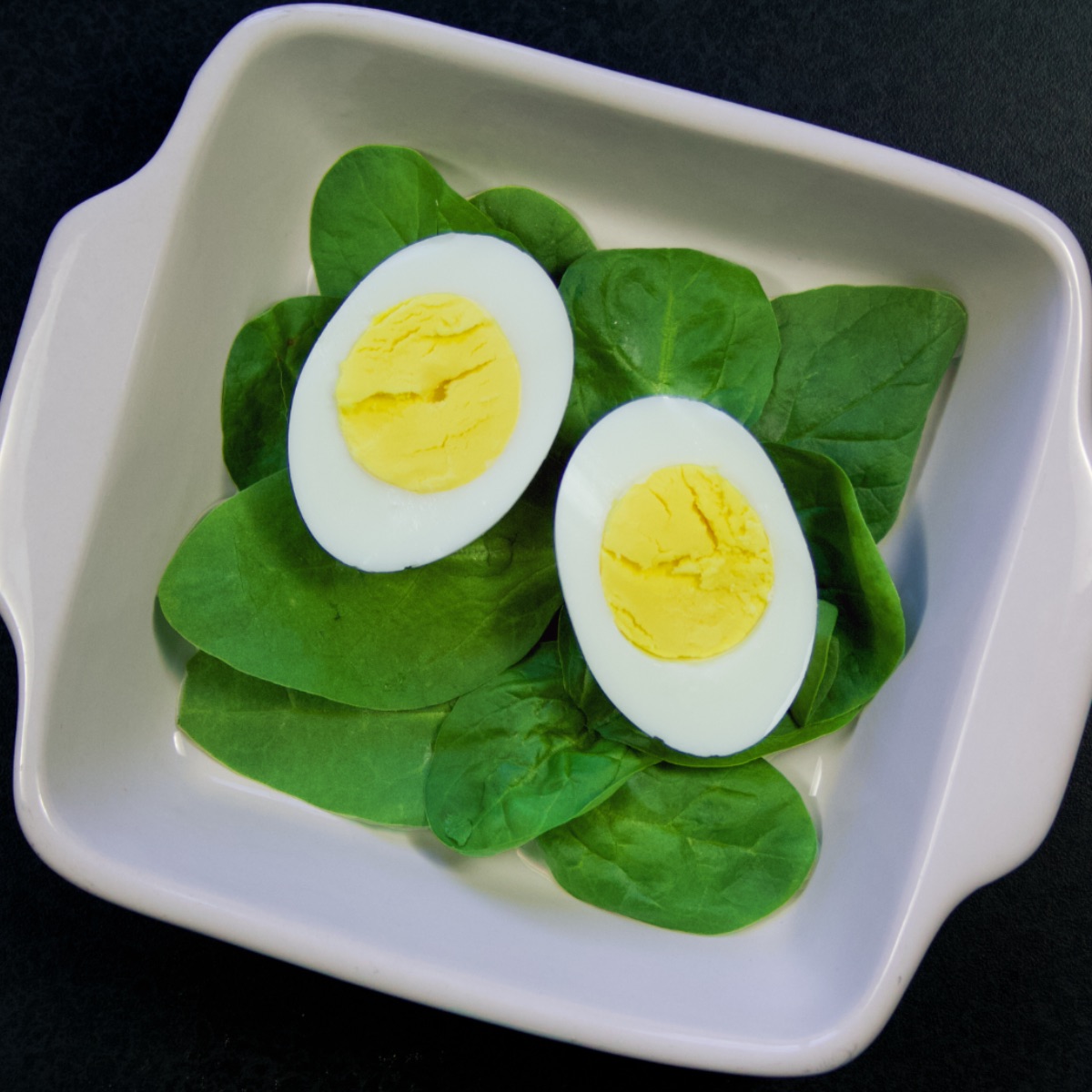
I love hard boiled eggs.
They're really versatile and great as a low-calorie, high-protein snack or as a topping for your favorite salad. If you're in a hurry, just have a couple for breakfast.
Regardless of your how you are using your eggs, you'll be happy to know you have a hard boiled eggs recipe that delivers consistent results every time.
Feel free to jump around to any of the topics below, or read the entire post for some great tips for making the perfect hard boiled eggs.
Jump to:
My egg salad recipe is another great use for these eggs!
How to hard boil eggs
Making hard boiled eggs is pretty simple, right? After all, it's just a matter of boiling some eggs.
Not so fast, my friend…there is a bit more to it. Do it wrong and you get those dreaded greenish-grey yolks, rubbery egg whites or undercooked, jammy yolks?
Follow my simple steps below and these concerns all go away.
Step 1 - Add eggs to a pan
First, use cold eggs straight from your refrigerator. Second, only add enough eggs to make a single layer on the bottom of the pan. Finally, make sure not to pack them in too tight: allow for a little breathing room.
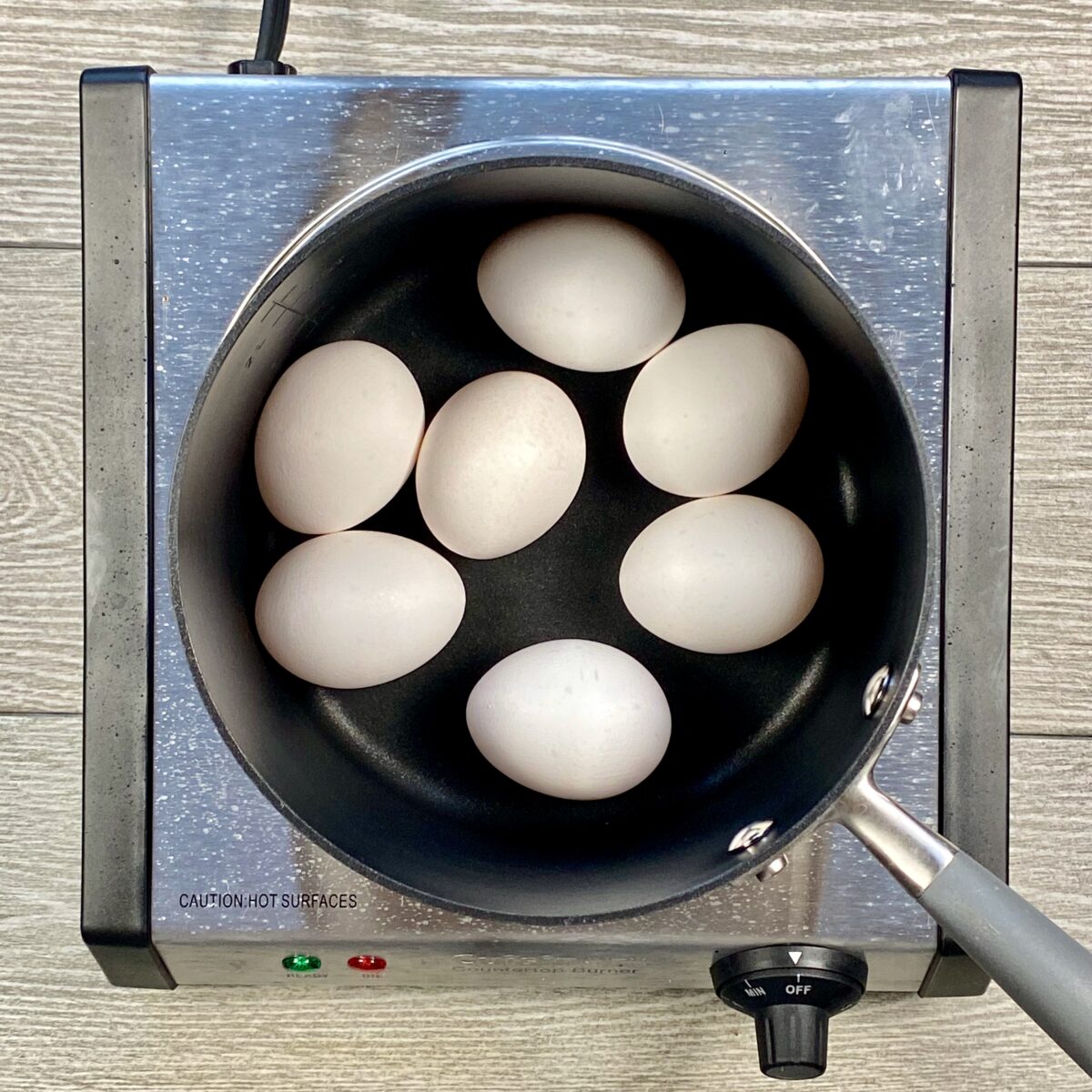
Step 2 - Add COLD WATER
Add enough COLD WATER so that you have a minimum of 1 inch above the eggs.
Using cold water allows the eggs to cook slowly as the water heats up. This is especially important for the egg whites: the gradual temperature increase produces the perfect tender egg white texture. Adding eggs to boiling water can produce rubbery egg whites and green yolks. Want the science behind it? Go here.
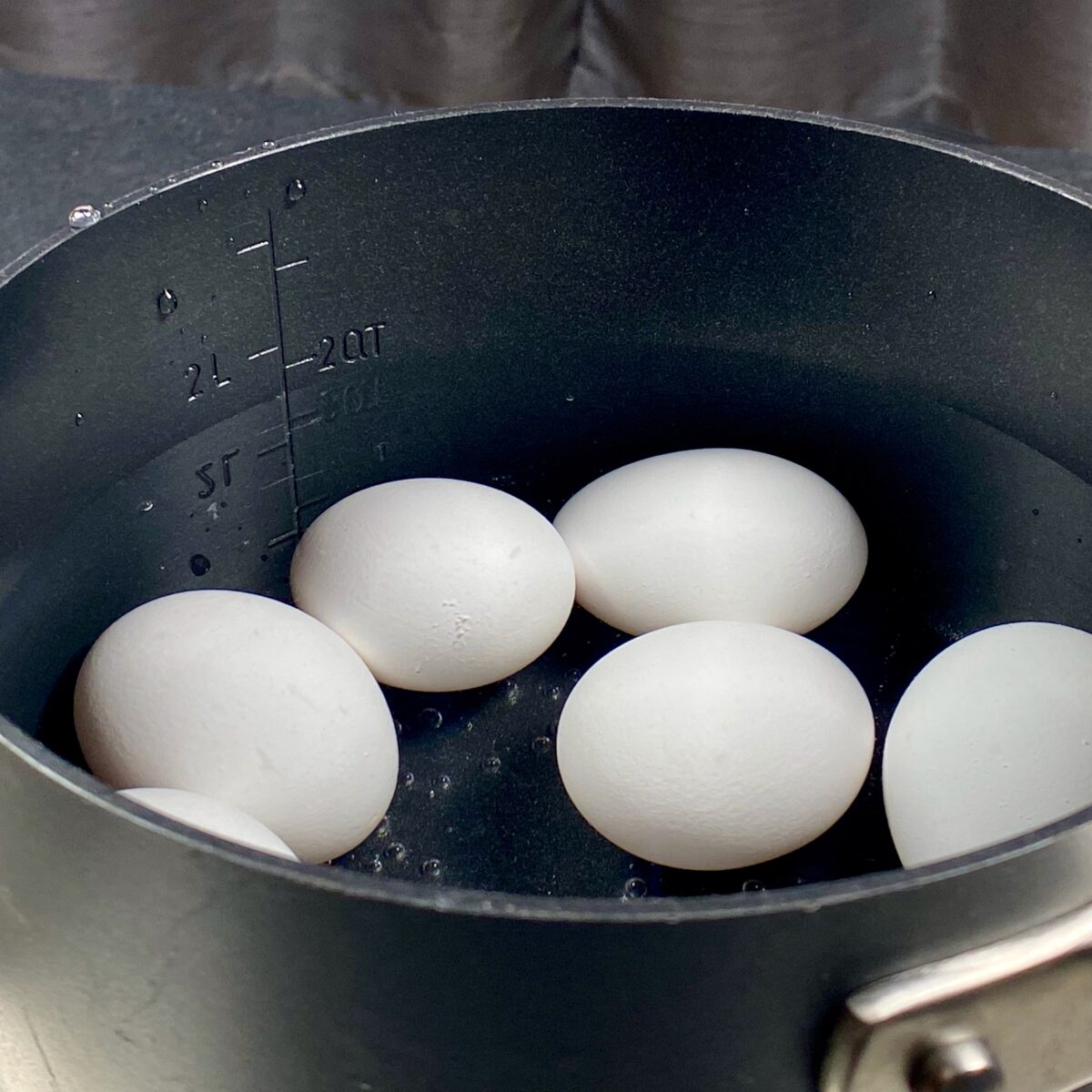
Step 3 - Bring eggs to a boil
Turn the burner on high and bring the water to a boil.
I always set a timer for 8 minutes to remind me to start checking on this boil.
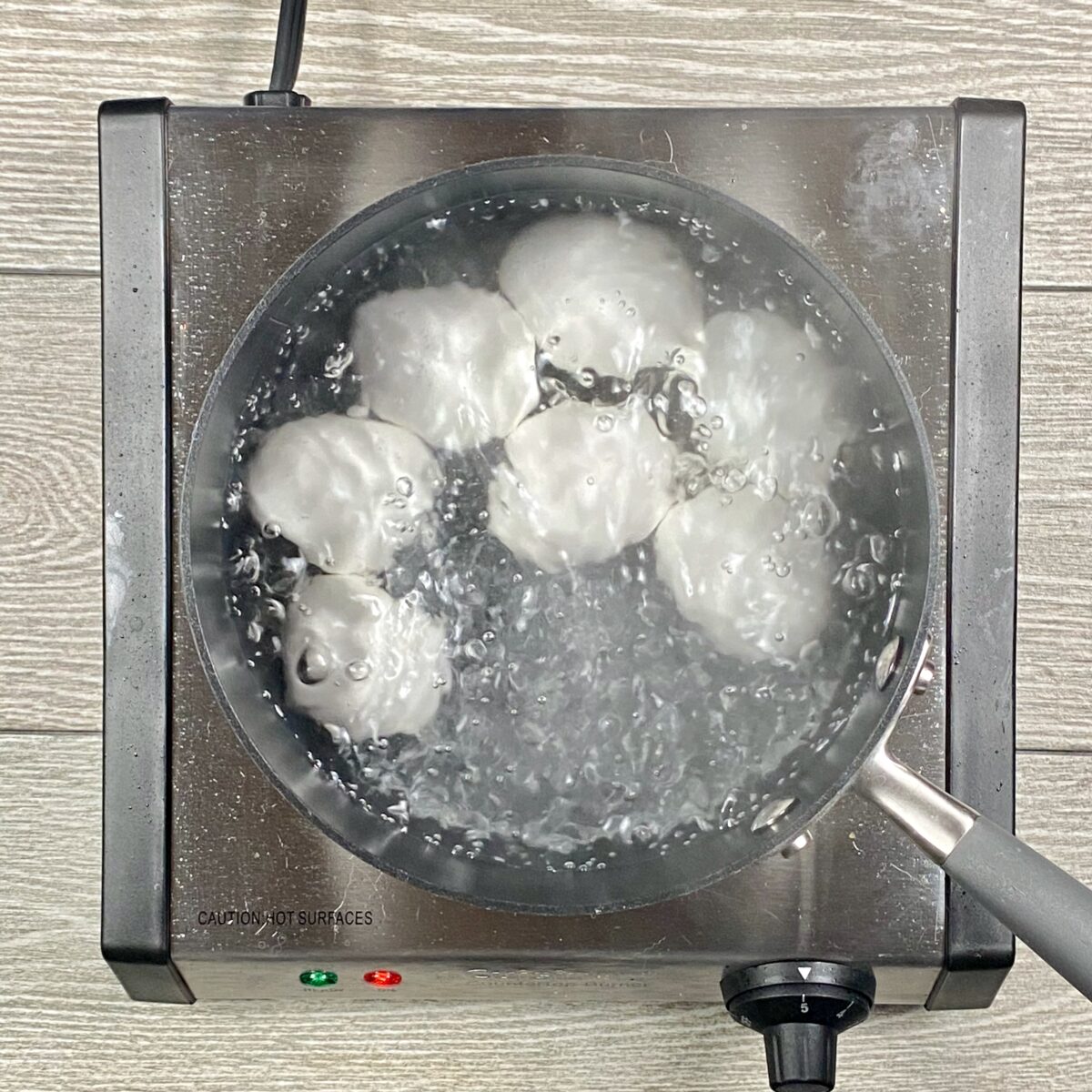
Step 4 - Remove from heat
The moment the water reaches a rolling boil, immediately remove the pan from the heat.
You will know a rolling boil is achieved at the very moment you begin to hear the eggs rumbling in the bottom of the pan.
Then cover and let the eggs rest in the hot water for the appropriate time depending on their size.
| Egg Size | Time in Hot Water |
|---|---|
| Medium | 13 minutes |
| Large | 14 minutes |
| Extra Large | 15 minutes |
| Jumbo | 16 minutes |
Again, set a timer. You don't want to miss your timing.
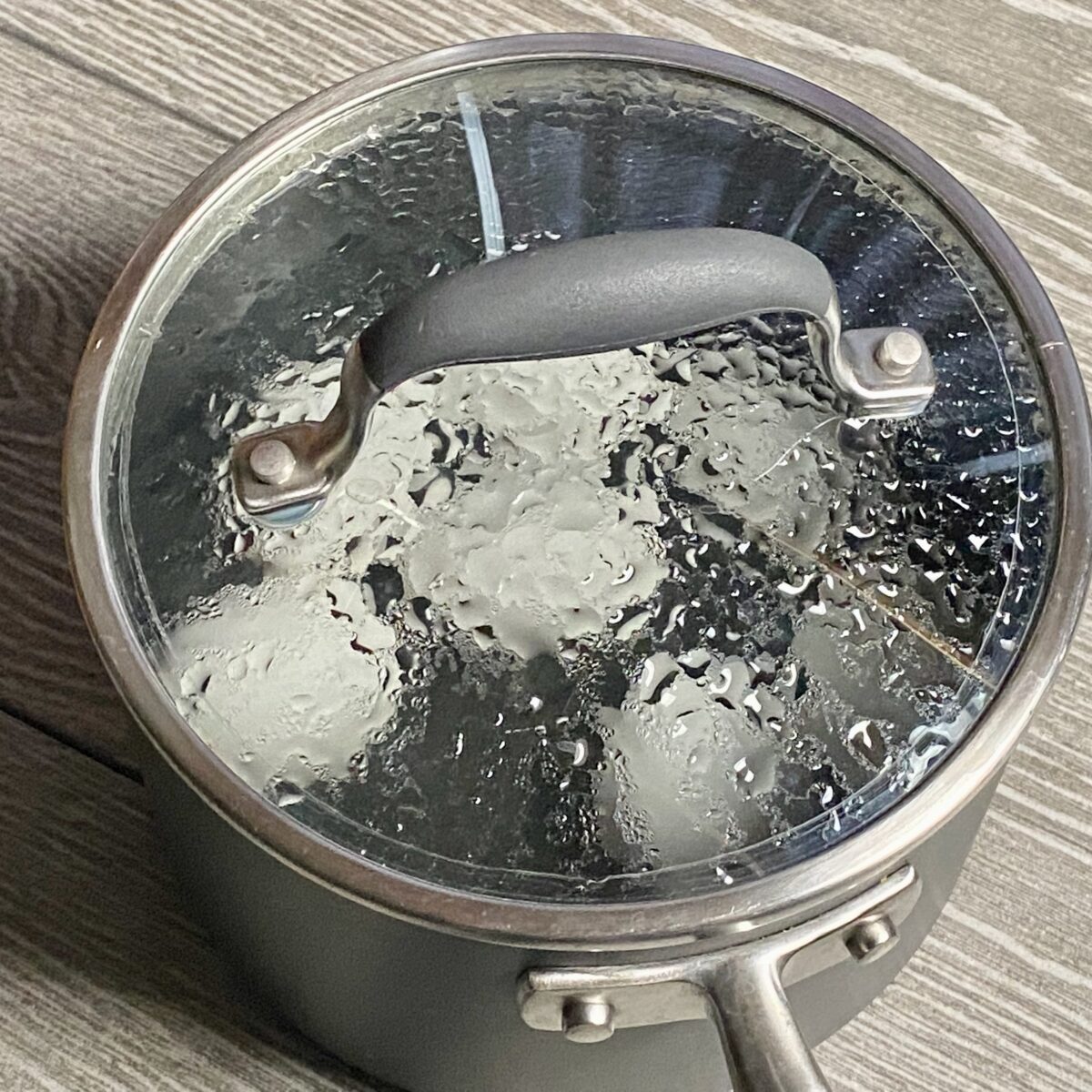
Step 5 - Place eggs in an ice bath
After the eggs have rested their allotted time in the hot water, it’s important to immediately stop the cooking process. To do this, place the eggs in an ice bath.
In a large bowl, place equal parts cold water and ice cubes. Make sure the water level will be high enough so that the eggs are fully submerged by an inch.
Then, using a skimmer or slotted spoon, carefully remove the eggs from the pan and place them into the ice bath.
Keep the eggs submerged for a minimum of 10 minutes before peeling. If the ice completely melts during this process, just add more.
Once cooled, peel and eat right away or store in the fridge up to 7 days.
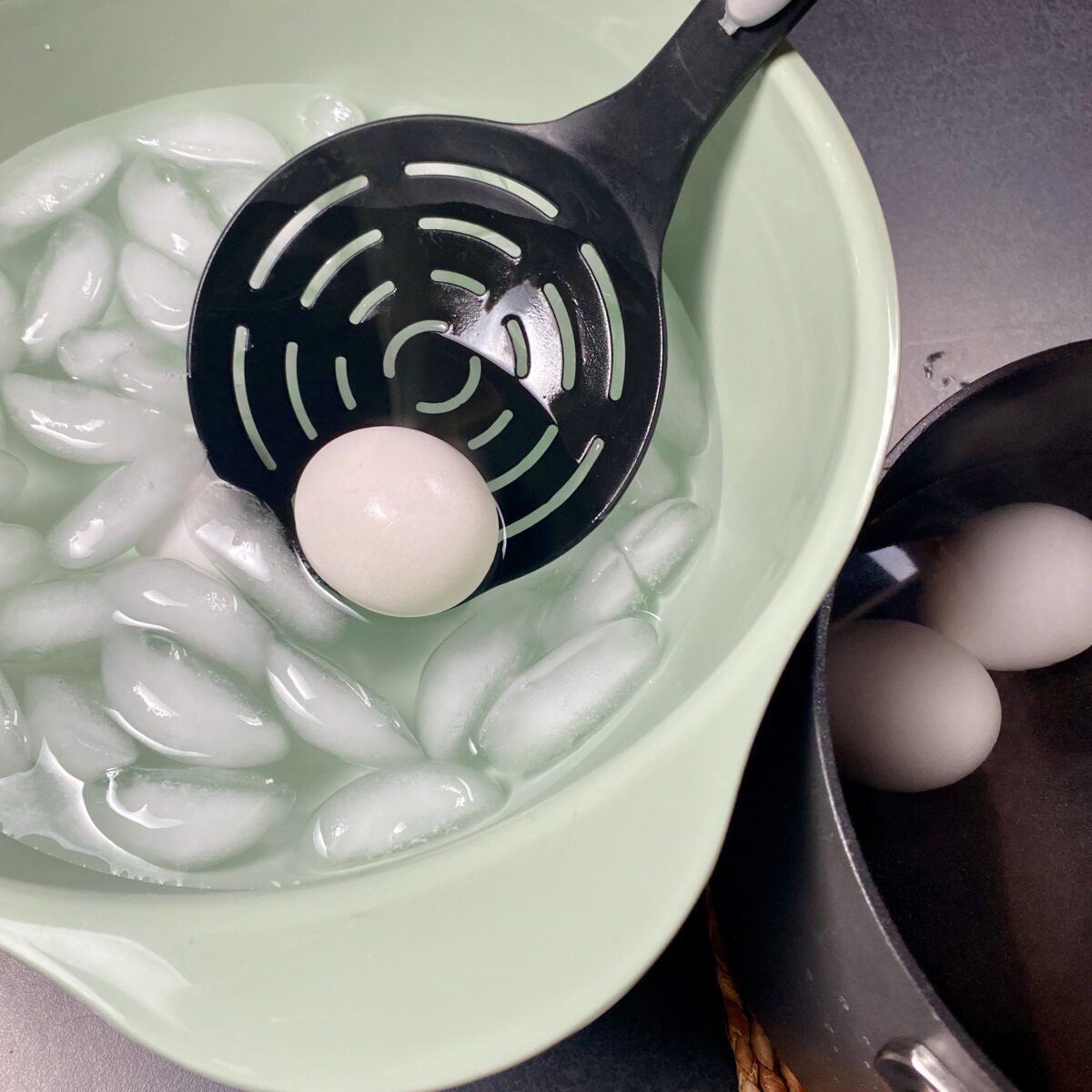
Best way to crack hard boiled eggs
Yes, you can always crack the eggs on the counter or even roll them around with a little bit of pressure.
The problem is that it is hard to control the pressure being applied. Many times you will end up with eggs whites that have split open.
There is a better way...
Use the backside of a spoon and gently tap it around the entire egg.
This allows you to control the pressure and you will see it is just as fast as doing it on the counter.
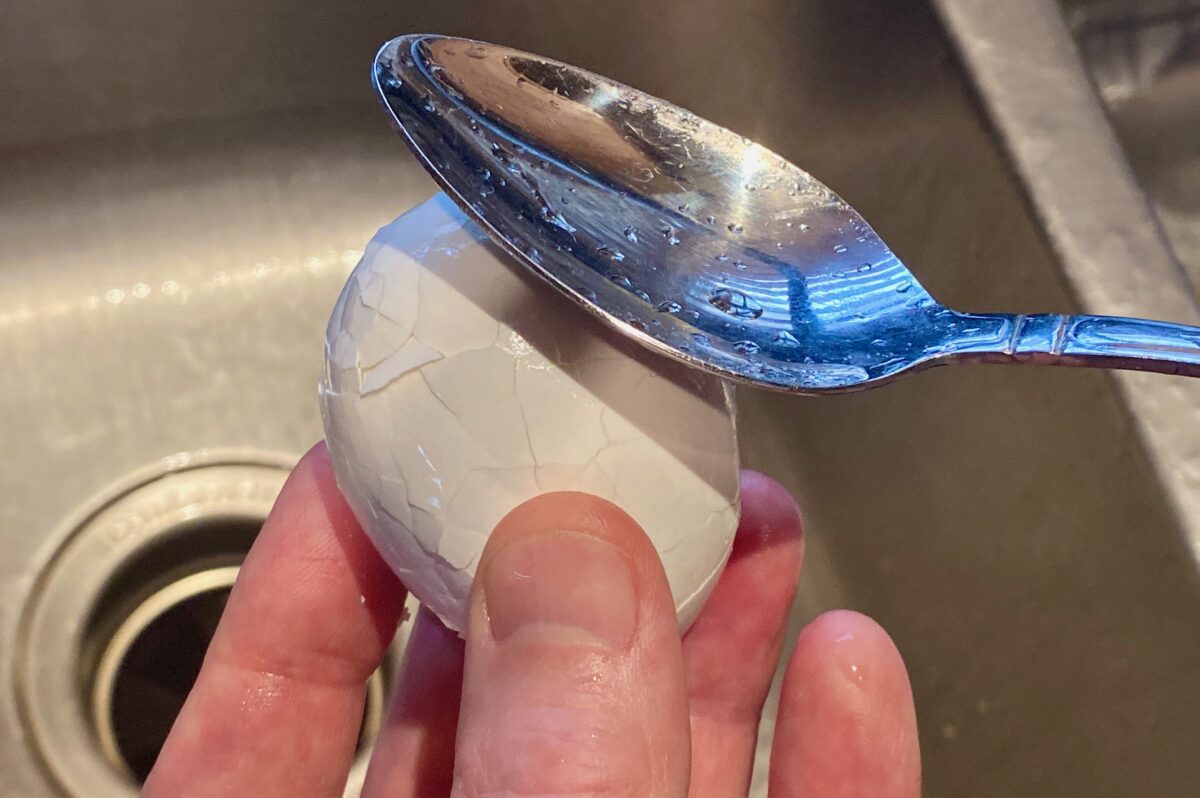
How to peel hard boiled eggs
I find that peeling eggs in a sink under running water works best. Always make sure that the water is landing on the egg section that you're peeling. The water helps create separation from the shell and the egg.
As you stand at the sink, use your fingers to peel away the cracked shell from one end of the egg.
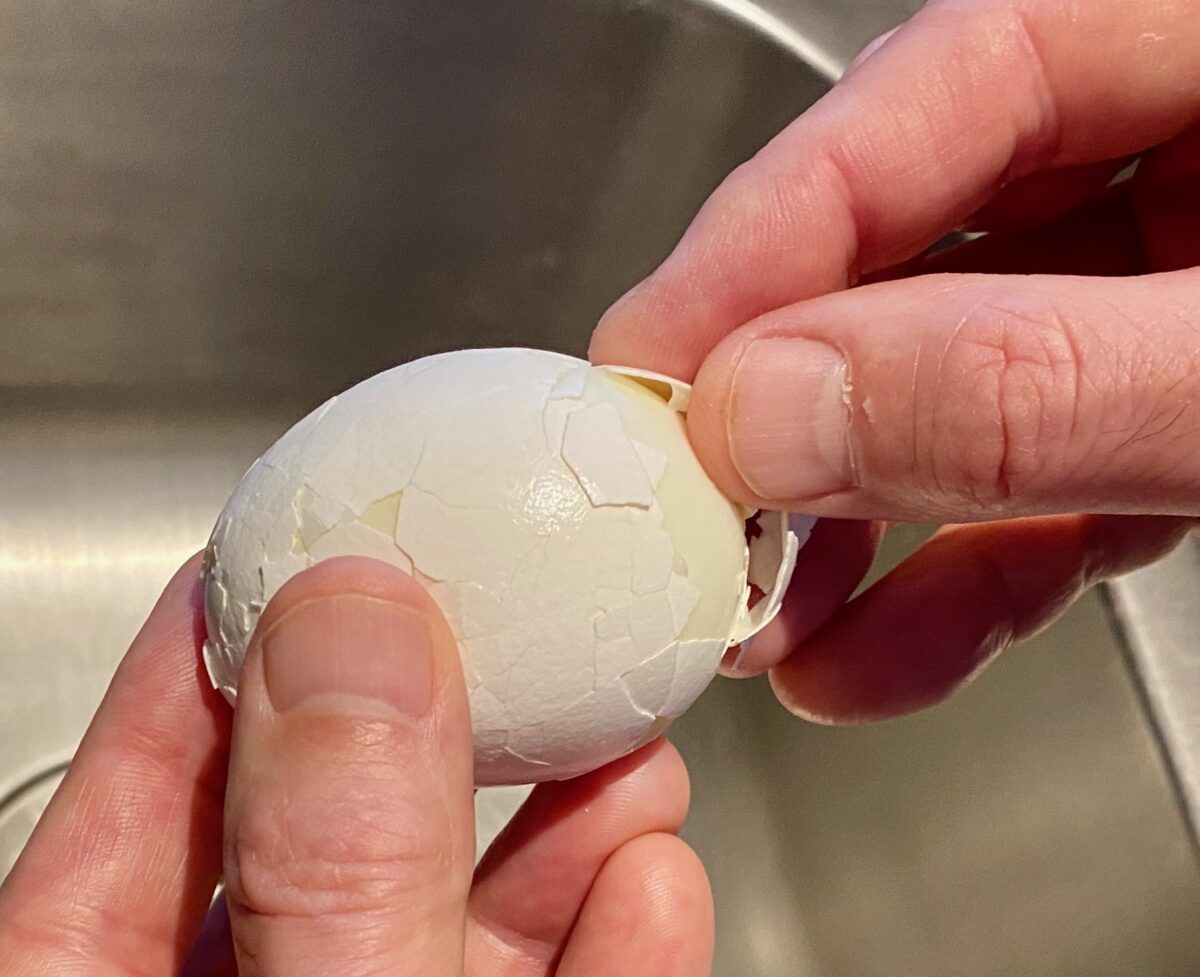
Now, very carefully, insert a small spoon between the shell and the egg white.
Holding the egg under the water, gently guide the spoon across the egg. You'll see the egg shell separating from the egg as you work.
Do this in small batches and don’t rush it.
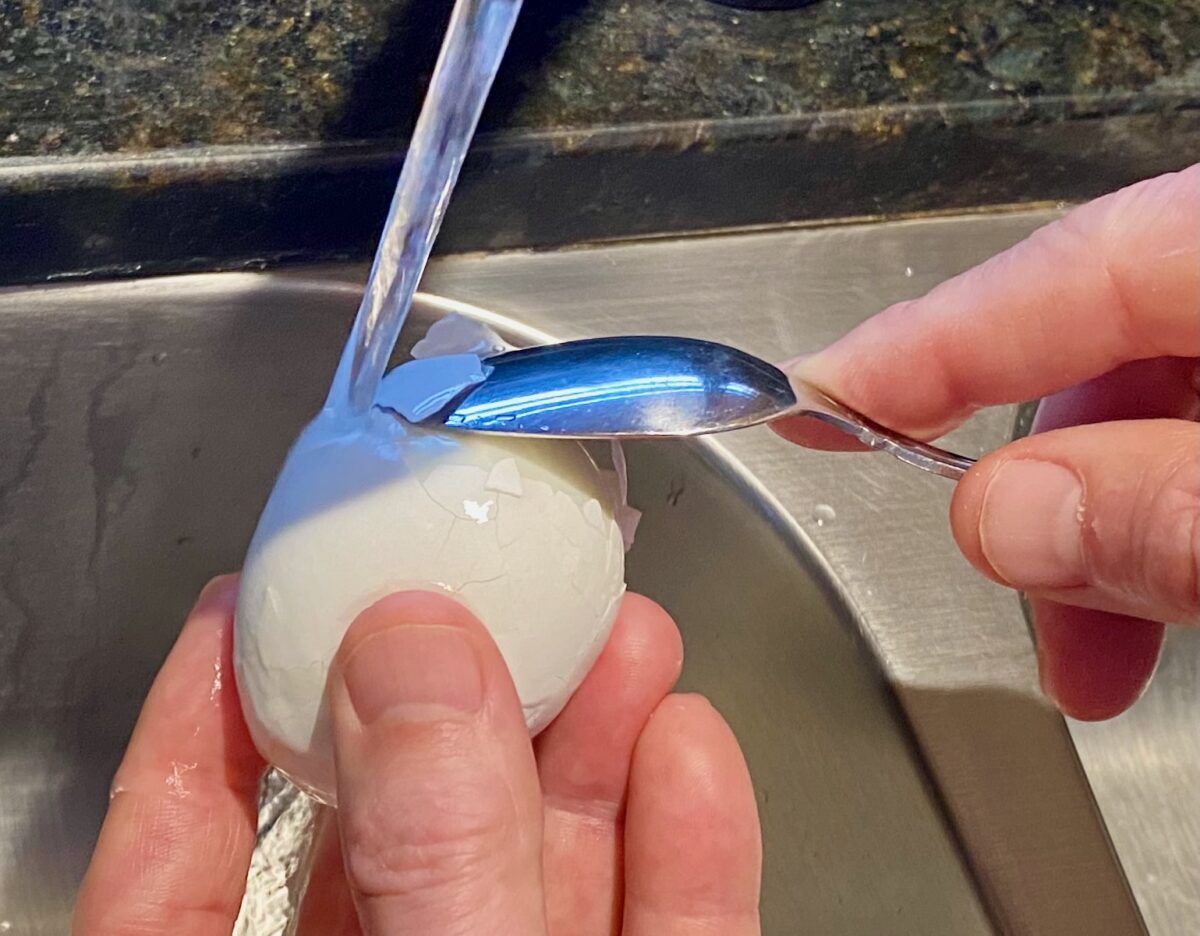
Yes, you will notice that sometimes the shell can stick to the egg and make the process a bit difficult.
You may now be asking yourself, "How do I make eggs that are easy to peel?"
How to make easy peel hard boiled eggs
Don't peel your eggs right after cracking them.
But rather, place the cracked eggs back into the ice bath and let them soak for 15 minutes.
The water will seep underneath the shell and create some separation allowing the peel to come off much easier.
Another strategy is to buy older eggs. Older eggs peel easier than newer eggs: it's as simple as that.
Grocery stores can stock their eggs up to 4 weeks before their use-by date. With this being the case, you should shop for these eggs 2-3 weeks before you actually boil them.
I always try to boil my eggs 7-10 days before this expiration date.
Important: Do not eat eggs that have passed their use-by date.
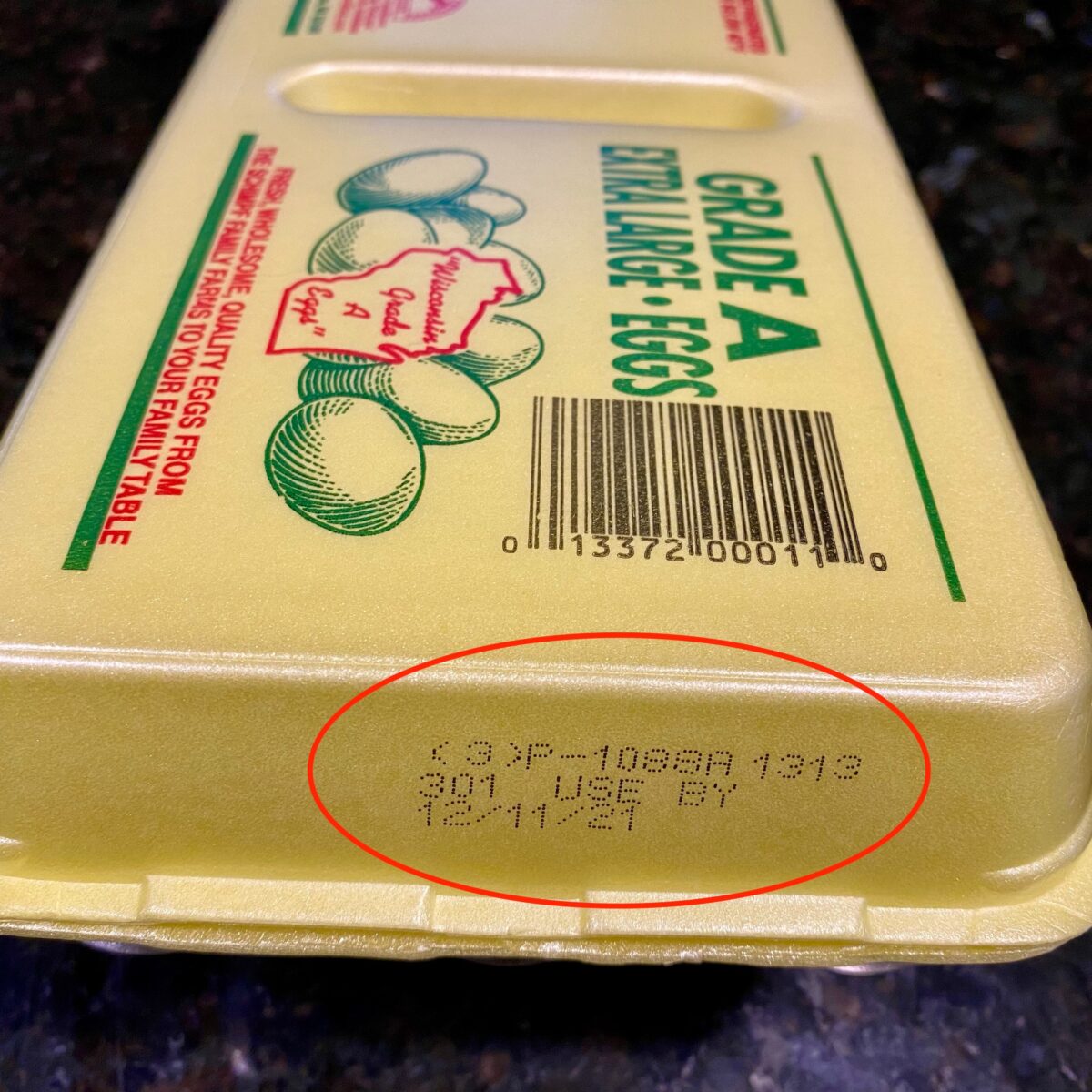
How long do hard boiled eggs last?
Hard boiled eggs will last 7 days in the refrigerator, regardless of whether they're peeled or unpeeled.
It's important to keep the eggs in a sealed container. If they're peeled, it's best to line the bottom of your container with a damp paper towel.
To remove any guesswork, I always write the boil date on a piece of tape to label my storage container:

Are hard boiled eggs good for you?
Quick answer: YES!
Hard boiled eggs are low in calories and are packed with protein, vitamins and minerals. The eggs whites are almost exclusively protein while the yolks contain vitamins and other nutrients.
You may be asking “what about all the cholesterol in eggs?”
True, eggs are high in cholesterol, but...
Did you know? Cholesterol makes up the plasma membrane of the cells in your body and has lots of important functions. It really doesn't deserve its reputation as dietary bogeyman.
As always, everything in moderation. In other words, don't re-enact the egg scene from Cool Hand Luke.
Recent studies have shown that eating foods that are high in cholesterol does not negatively impact blood cholesterol for most people. There is even evidence showing that eggs can actually improve a person's good HDL cholesterol levels.
Healthline has a great article on the health benefits of eggs.
Common hard boiled egg issues
All issues you encounter will either be under- or overcooking the eggs.
Undercooked eggs will have a jammy yolk centers. The likely reason for this is because you didn't allow the water to come to a full boil before removing the eggs from the heat to rest.
The opposite of this is the reason for overcooked eggs. If you get green-ish egg yolks or rubbery egg whites, you likely left them in the boiling water a bit too long.
Not removing the eggs from the hot water and into the ice bath at the specified times would also result in under- or overcooked eggs.
What recipes use hard boiled eggs?
- Many potato salad recipes use hard boiled eggs, like my Traditional* Potato Salad.
- Hard boiled eggs are amazing if you marinate them, as in Soy-Miso Marinated Ramen Eggs.
- Some folks like to add hard boiled eggs to their gravy at Thanksgiving (check out my Easy, Rich Turkey Gravy, which does not include eggs—but they're easy to add).
- Deviled Eggs with Relish
- Egg salad
That's all there is to it!
This is a great technique to have in your arsenal. Enjoy!
Stay safe. Stay well.
—xoxo Michelle
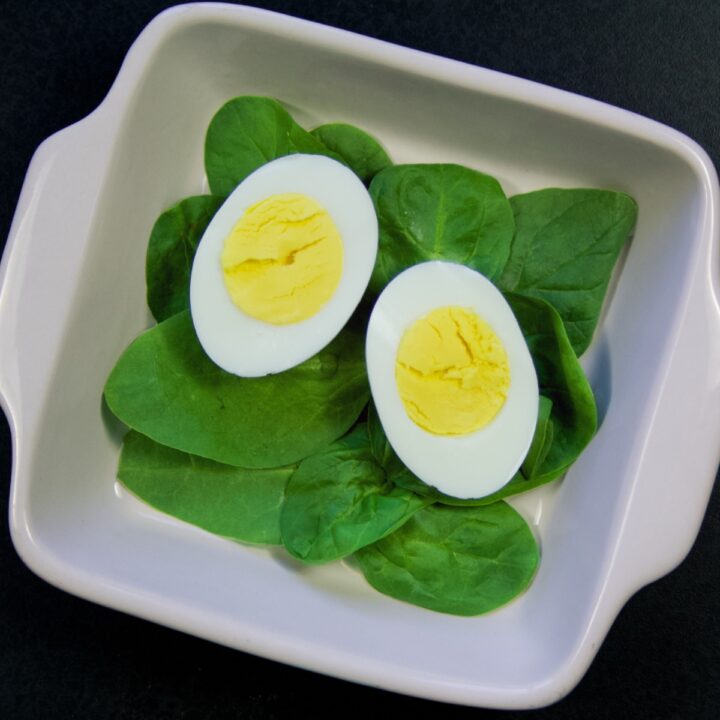
Easy Hard Boiled Eggs
This hard boiled eggs recipe is incredibly easy and turns out perfectly fluffy yellow egg yolks every time. Your "go-to" recipe anytime you need hard boiled eggs.
Ingredients
- 6 extra large eggs, cold
- Cold water
Instructions
- Lay the eggs in a single layer on the bottom of your pan.
- Add enough cold water until a minimum of one inch covers the eggs.
- Add the pan of water and eggs to your stovetop and turn your burner on high to bring water to a boil.
- At the moment your water reaches a rolling boil and you hear the eggs beginning to rumble in the pan, remove from the heat and cover the pan . Allow the eggs to rest in the hot water for:
13 min: Medium eggs
14 min: Large eggs
15 min: XL eggs
16 min: Jumbo eggs - After resting for the allotted time, immediately remove the eggs from the pan and add to an ice bath to stop the cooking.
- Allow eggs to cool a minimum of 15 minutes before peeling.
Recommended Products
As an Amazon Associate and member of other affiliate programs, I earn from qualifying purchases.
Nutrition Information:
Yield: 6 Serving Size: 1Amount Per Serving: Calories: 72Total Fat: 5gSaturated Fat: 2gTrans Fat: 0gUnsaturated Fat: 3gCholesterol: 186mgSodium: 73mgCarbohydrates: 0gFiber: 0gSugar: 0gProtein: 6g
Nutrition data provided here is only an estimate: if you are tracking this information for medical purposes, please consult a trusted external source. Thanks!




Leave a Reply